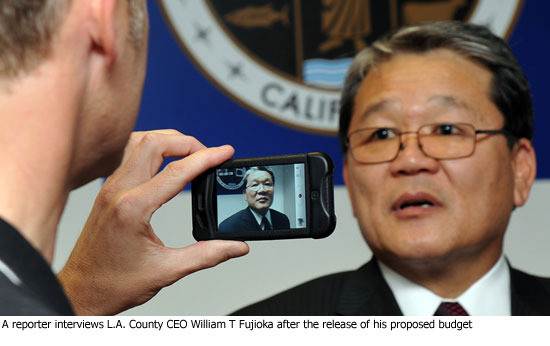CEO tightens county’s belt
April 19, 2010
Reflecting the hardships of the prolonged recession, Los Angeles County Chief Executive Officer William T Fujioka unveiled a proposed budget Monday that attempts to close a $510-million deficit by cutting labor costs, reducing some services and dipping into reserves set aside during better times.
The measures suggested by Fujioka, however, are far less severe than those being pursued by other local governments, including the City of Los Angeles, where officials have proposed sweeping cuts in services and jobs to avert a full-blown financial crisis.
“The County of Los Angeles is still in a very, very strong position,” said Fujioka, who credited prudent budgeting by the five-member Board of Supervisors.
Fujioka’s $22.7 billion budget for fiscal year 2010-2011 proposes a combination of departmental cutbacks that include the elimination 1,374 budgeted but unfilled jobs. Fujioka proposes withdrawing $167 million from reserves, one dubbed the “rainy day fund.” He predicted that actual layoffs would likely number less than 100, thanks in part to an agreement last year with unions that provided for two-year contracts with no additional cost-of-living raises.
That said, Fujioka said his office is still negotiating with labor representatives to find another $115 million in cuts. He declined to provide specifics.
Given early but encouraging signs of an economic rebound, Fujioka said during a meeting with reporters and county officials that next year’s $22.7 billion budget, which is 3.7 percent less than this year, could represent the leanest of all.
“We’re predicting that next year will be the most difficult [of the past three] for the county,” he said.
Deep recessions undermine county finances by reducing local tax revenues and state funding while raising demand for vital welfare and health care services for the county’s neediest residents, whose numbers climb in tough economic times.
Here are some of the highlights of the CEO’s spending plan:
• The Sheriff’s Department would absorb a predicted $128 million cutback, resulting in the elimination of 300 budgeted but vacant positions and a reduction of overtime spending that has put the department’s brass—including Sheriff Lee Baca—back in patrol cars. The District Attorney’s Office could lose up to 25 unfilled positions and face a spending reduction of $7.9 million.
• The Health Services Department would face a $362.4 million cut, although the CEO’s office and the department have yet to say where those reductions would be found.
• Public libraries would see reduced hours at some branches as they absorbed a $4.5 million budget cut. Also eliminated would be adult-literacy programs.
• Total budgeted county employment would drop from 101,113 to 99,736.
• County welfare spending would climb, including a predicted 12.6 percent hike in residents who request General Relief, the stop-gap welfare payment of $221 per month for the county’s neediest residents. The caseload for In-Home Supportive Services, a state funded program to help the elderly and infirm stay in their homes, would grow by 5.5 percent, according to budget assumptions, and the CalWORKS assistance program, helping families with children, would grow by $151.7 million.
The unveiling of the budget is the first step in a long process that includes Board of Supervisors hearings in early May and adoption in June.
Even after the new fiscal year begins July 1, budgets will have to shift as the uncertainties of projected revenue estimates give way to the sometimes harder realities of actual tax collection and funding from state and federal sources. In fact, the budget is not fully finalized until September.
What’s more, substantial revisions could occur because of revenue assumptions used by Fujioka and his budget team. They made the calculation, for example, that property tax receipts would drop by 2 percent for the year, although the Assessor’s Office predicted a drop of 2.7 percent. The budget also assumes that Congress will come through with $40 million in federal matching funds for health-care programs.
And then there are the uncertainties of Sacramento.
Fujioka said that Gov. Arnold Schwarzenegger’s proposed state budget would slash $1.5 billion from the county, if passed untouched. But the CEO said that won’t happen. He suspects that the final state budget could, indeed, create more financial problems for the county but that it’s too early to know how severely. Fujioka said that’s why he did not factor any possible Sacramento cuts into his proposed budget.
Posted 4-18-10













 405 bridge work causes a stink
405 bridge work causes a stink
